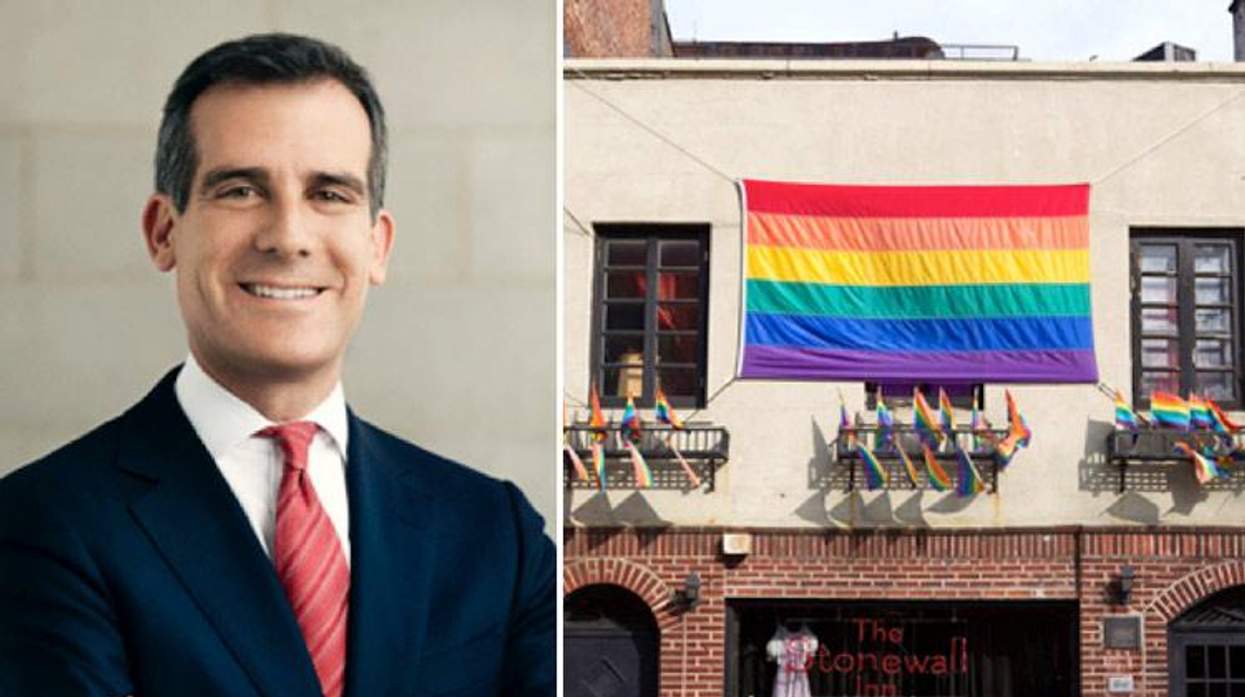When it comes to honoring LGBT history, Los Angeles Mayor Eric Garcetti has no rivalry with New York City: He's added his voice to the chorus seeking to designate the Stonewall Inn as a National Monument.
In a letter sent to President Obama last week and posted online by the Human Rights Campaign, Garcetti called for making the Stonewall and the adjacent Christopher Park a National Monument under the Antiquities Act. This would protect and preserve it under the management of the National Park Service.
"The Stonewall Riots in 1969 served as an historic turning point in LGBT history," Garcetti wrote. "Recognizing the Stonewall Inn and Christopher Park in New York City's West Village would honor the American LGBT experience in every city and help to teach people of an important historical event that has helped to shape our nation."
Garcetti also noted the significance of Los Angeles in LGBT history, pointing out the protests at the Black Cat bar in the city's Silver Lake neighborhood after a police raid. In 2008, when he was president of the L.A. City Council, he successfully lobbied for the bar to be designated a city landmark. Other Los Angeles contributions to LGBT history include the formation of the Mattachine Society, the founding of One Magazine, and hosting the first Pride parade to mark the anniversary of the Stonewall uprising.
"It is with this history in mind that I write in support of designating the Stonewall Inn in New York City as a National Monument through the Antiquities Act," Garcetti wrote.
The Stonewall Inn is listed on the National Register of Historic Places, which makes it eligible for public and private preservation grants, and last year it was designated a landmark by the New York City Landmarks Preservation Commission.
National Monument status, which New Yorkers have been calling for, would provide further protection for the site and potentially lead to further memorials being developed there. Right now there are two sculptures representing same-sex couples in Christopher Park, across the street from the bar, and these would remain, but potentially the park service would add signage or create tours of the area, as Grist reported last fall.
Also, the move would bring "the storytelling and historic interpretation capacity and, frankly, brilliance of the national parks department to the gay rights story," Cortney Worrall, northeast regional director for the National Parks Conservation Association, a private advocacy group, told Grist.
Above all, it would give proper respect to the LGBT rights movement, as it would be the first National Monument commemorating this struggle. "The dedication of a monument to Stonewall would place it alongside other historic sites of America's civil rights journey, like Seneca Falls and Selma, and would provide federal recognition of the birthplace of the LGBT civil rights movement," Congressman Jerrold Nadler of New York wrote in an Advocate commentary last year.
Garcetti's letter makes it clear he concurs."The struggle for equality touches us all and our National Monuments are an excellent apparatus for telling America's history," he concluded. "I hope that by designating Stonewall as a National Monument we preserve a part of history that has long lived in the shadows."




































































Charlie Kirk DID say stoning gay people was the 'perfect law' — and these other heinous quotes